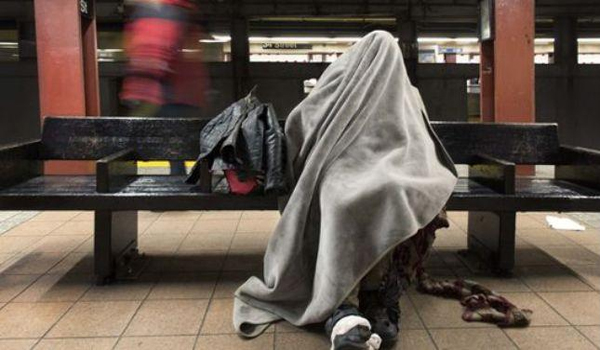More US cities are passing laws that make it illegal to camp in public, sleep in vehicles on city streets, or sit or lie down in public, a new report shows.
The laws are meant to curb the problems associated with homelessness, such as public drunkenness and sleeping on the sidewalk. But the report, released Wednesday by the National Law Center on Homelessness and Poverty, says the laws criminalize people just for being homeless.
Maria Foscarinis, the center’s executive director, says there has been a striking increase in city laws prohibiting camping on any park, sidewalk or public space.
In 2014, 64 communities had citywide bans on public camping, up from 40 in 2011.
The number of cities that prohibit sleeping in vehicles jumped from 37 in 2011 to 81 in 2014 and the number of cities that prohibit sitting or lying in public spaces increased from 70 in 2011 to 100 in 2014. Often called “sit/lie” laws, they prohibit the homeless from sitting or lying down on any street, sidewalk, entrance to a story, alley or other public place.
More cities also passed bans on begging, loitering and sharing or giving food away in public places, which hurts pantries or churches who give food to the homeless on the street. The penalties vary by city and law and can include fines or jail time.
Foscarinis says a few things have contributed to the increase in laws. First, she says, in the aftermath of the recession, more people lost jobs and homes to foreclosures, which resulted in more people living in cars, setting up camps in public spaces and overwhelming shelters.
Secondly, she says, many cities, particularly in their downtowns, are gentrifying and revitalizing urban neighborhoods. Much of the revitalization includes luxury or more expensive housing.
“They have an interest in not having poor people be very visible,” she says. Foscarinis says nationwide there is a housing crisis.
“We see fewer affordable housing units, particularly for the very poor,” she says. That includes federally subsidized housing, which often have years-long wait lists, she says.
In May, Fort Lauderdale, Florida passed the first of a series of laws officials hope will fight problems associated with the homeless, including panhandling, public drunkenness, begging, sleeping on sidewalks and urinating and defecating in public.
The City Commission passed a law that makes it illegal to store personal property on public property and leave it unattended. The law allows police to confiscate a person’s belongings if they are left on public property for more than 24 hours. Owners would have to pay to retrieve their belongings and police can get rid of unclaimed property after 30 days.
So far, there have been no violations reported, says city spokesman Matt Little.
The city is trying to balance the needs of housing the homeless with protecting the quality of life for residents and visitors, Little says. About 3,000 people in Broward County are homeless, he says.
The suggestion that the laws hurt the homeless has no merit, says Little.
In an e-mail, he says, the city has an outreach program for the homeless through its police department, the first in South Florida to set one up. And with a federal grant of $441,000, the city provides permanent housing to 22 disabled and chronically homeless people.
“The city of Fort Lauderdale has a distinguished history of compassion toward those in need,” he says. “Protecting our quality of life and business environment ensures continued funding for humanitarian needs.”
Still, it’s not enough. Both Little and Foscarinis say there needs to be more state and federal funding to address the problem on a large scale. “Cities do not have the resources to single-handedly solve regional and national problems,” Little says. USA Today


